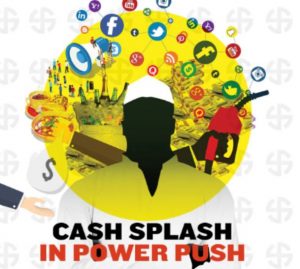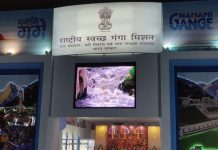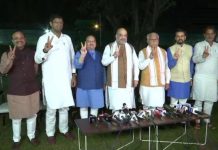Haryana is notorious for giving Aya Ram Gaya Ram-type (in reference to the practice of MLAs defecting to other parties) of politics to the country and now it has added another feather to its cap by learning how to hoodwink authorities in manipulating poll expenditures. Tehelka is in possession of guidelines concerning the expenditure for various items to be used in elections issued by authorities but various candidates know how to fudge figures while fighting the elections.
As per the Election Commission of India (ECI), the permissible amount for the poll expenditure in Haryana for a candidate is 28 lakhs, which includes public meetings, banners, posters, rallies, vehicles, expense on campaign workers, advertisements in print and electronic media.
According to the ECI, all parties should adhere to the maximum expenditure limit and mandate all payments made above 20,000 through the account payee cheque. As per the law, the candidates need to submit their expense details within 30 days after the election results are announced, which includes details of funds received from various sources and also the campaign expenses. If any candidate found not adhering to the law, he or she will be disqualified from being a legislator and also barred from being chosen as a member of the assembly.
It is here where the catch lies. Karnal-based senior advocate Y.K Kalia told Tehelka that “while there are law enforcing authorities to check poll expenses, there are equally strong and notorious mafias that teach candidates how to hide expenses and show expenses within the permissible limits. This includes poll strategists, financial management experts and social media operators, who spend money for a candidate’s promotion and show the expenses as spent by supporters.”
A Panchkula-based business man Dhiraj Dev questioned the overall process and the restrictions imposed by the EC on the permissible amount. He said, “Everyone including the election commission knows that the elections are not being fought in the said amount, still almost every candidate is able to get a clean chit from the EC. Everyone knows the types of unfair practises being used in the elections and the distribution of cash via various means but still every candidate comes out clean.”
A Kurukshetra-based farmer on anonymity told Tehelka, “Coordinators of various parties visit frequently our and nearby villages and offer lots of goodies and cash to the villagers. Many poor people who are in need of money agree to vote for them on the pretext of the promised amount and other things.”
Now the question arises, are candidates following the law and sticking to the permissible amount or is there more than what meets the eye?
We all know that in order to win elections every candidate spends maximum to influence the voters. On an average, a candidate spends amounts ranging between 1 to 3 crores depending on the constituency. However, expenditure in many urban constituencies can go up to 5 crores and may be more depending on the spending power of a candidate. When supporters of different parties were asked about the poll expenditure by the candidates, all of them said one thing that it is impossible to fight elections in the amount prescribed by the regulatory authorities. On anonymity, a supporter of a right-wing party said that candidates are spending huge amounts via various means to win the elections.
We all know that elections in India are based on the 3Ms i.e. Money, Mind and Muscles and candidates use them most extravagantly to influence the voters. While investigating the means of unaccounted expenditure by various candidates, it has been noticed that how the candidates and their supporters have found a way to hide actual expenditure and present before the regulatory authorities which is within the permissible limits.
Fuel for vehicles
In our investigation, it has come to the fore that all parties and their candidates have somehow tied up with various fuel stations across the state, where one of their party members is stationed at the time of public rallies to coordinate. It has also been found that all vehicles participating in the rally do not pay for fuel at the time of filling it and the payment is done later by the coordinator, who notes down the amount of fuel filled and the total payment needed to be made which they reimburse later in cash.
Free liquor
In most rural and urban areas, party coordinators of candidates do tie-ups with the local liquor shops and provide them with a particular date and time when people will visit their shops. One of the campaign workers of the party visit the liquor shop at that particular time and distributes free liquor among the people on the pretext of promising the support for the candidate. In many cases, some slips are distributed among people which could be redeemed at the liquor shop by getting the designated liquor.
Cash and food
On an average, a candidate does more than 100 public rallies and meetings in their constituency. We all know every candidate addresses gathering from few hundred to thousands of people depending on the areas they are visiting but what we do not know is what is being offered to some people who come to listen to the candidates. Every candidate wants to show his popularity among the masses and the support he is garnering from people. To show that strength and to influence other voters many candidates with the help of their coordinators gets people from across the state to attend the rally and in return, they are offered cash and food. In most cases, people are being offered an amount of 500 per person to attend the rally with free food for that day. Again, this amount is being paid in cash and is unaccounted for but if you do the maths, you will come to know the amount being spent by a candidate.
Social media spending
Nowadays candidates are giving their full attention to all social media and digital platforms for all their promotional activities. The election commission has prescribed budget for advertisement and promotional activities for electronic media. The election commission is keeping a hawk-eye in monitoring the official pages of the candidates and expenditure done by it but what is being in practice is something very difficult to track. Most of the candidates have hired good social media teams who not only run and manage the official pages but supporting pages too and it is difficult for the Election Commission to keep a tab on these supporting or affiliate pages and the amount spend on the campaigns through them. One of the recent cases that brought attention to this issue was Punjab’s Gurdaspur seat during the Lok Sabha elections 2019 from where the joint candidate of BJP-Akali Dal, Sunny Deol won the election. Vice-president of congress party Himanshu Pathak had filed a complaint against one of the supporting pages of the actor ‘Fans of Sunny Deol’ claiming that the page did pay promotions digitally at the time of elections to support Deol’s social media campaign. Later an amount of 1,74,644 was included in Deol’s poll expenditure by the Chief Electoral Officer after an inquiry was conducted by a nodal officer of the media certification and monitoring committee of Gurdaspur.
ECI has set a “voluntary code of ethics”, according to which no party or candidate will be allowed to run a political campaign on social media platforms in the last 48 hours before the polling ends. The code is derived to act against paid promotions which violate regulations set by the Election Commission. On 19th March 2019, the ECI convened a meeting with the country heads of major social media companies to discuss issues related to the use of social media in the elections. Companies like Facebook, Twitter, WhatsApp, Google, TikTok have agreed to follow the “voluntary code of ethics” during all the elections, including the upcoming Maharashtra and Haryana Assembly polls and various by-elections being held simultaneously.
As per an ECI release, issued on September 26, 2019, the Internet & Mobile Association of India (IAMAI) on behalf of its members has agreed to observe the “Voluntary Code of Ethics” during all the elections, from the ongoing general elections to the Haryana & Maharashtra legislative assemblies and various bye-elections being held simultaneously. IAMAI and social media platforms Facebook, Whatsapp, Twitter, Google, Sharechat and TikTok had presented and observed this “Voluntary Code of Ethics” during the General Election to 17th Lok Sabha 2019. IAMAI has assured the Commission that the platforms will cooperate in ensuring the conduct of free and fair elections.
As a result of the Commission’s vigorous persuasion, all the major social media platforms and IAMAI came together and mutually devised this “Voluntary Code of Ethics” for the General Elections 2019. This came into immediate effect from the day it was presented to the Commission on 20th March 2019. During the election period, social media platforms took action on 909 violation cases reported by the ECI.
The highlighted features of the “Voluntary Code of Ethics” are (i) Social Media platforms will voluntarily undertake information, education and communication campaigns to build awareness including electoral laws and other related instructions. (ii) Social Media platforms have created a high priority dedicated grievance redressal channel for taking expeditious action on the cases reported by the ECI. (iii) Social Media Platforms and ECI have developed a notification mechanism by this ECI can notify the relevant platforms of potential violations of Section 126 of the R.P. Act, 1951 and other electoral laws. (iv) Platforms will ensure that all political advertisements on their platforms are pre-certified from the Media Certification and Monitoring Committees as per the directions of Hon’ble Supreme Court. (v) Participating platforms are committed to facilitating transparency in paid political advertisements, including utilising their pre-existing labels and disclosure technology for such advertisements.
This malice is not confined only to Haryana. Even in Maharashtra, which just witnessed polls, has seen such practices being used in the election campaigns. A seizure of 4 crore cash in Mumbai is a clear indicator of how funds are being manipulated during elections. In a press conference on 1st October by The Directorate General of Income Tax (Investigation)
(Investigation) Maharashtra, it was brought to the public’s notice, the black money being circulated since the declaration of Maharashtra Assembly Elections.
According to the press briefing by DGIT (Investigation) in Mumbai, it was informed that illegal cash worth 4 crore had been seized by the Department, since the declaration of Model Code of Conduct by the Election Commission of India, on September 21, 2019.
Elaborating on the steps taken by the Department, the DG informed the media that the Department is working in close coordination with several law enforcement agencies and other government departments, in order to contribute to the conduct of free, fair and smooth elections. The DG also informed that on the regulatory front, a system has been put in place to gather intelligence inputs regarding the movement of cash and valuables and to take immediate action in this regard. 24*7 control rooms are operational at Mumbai, Pune & Nagpur and 40 Quick Response Teams – including six in Mumbai, have been set up at various districts/constituencies across the state.
Apart from this, Air Intelligence Units (AIUs) at all the functional airports and airstrips have been set up, in order to monitor and check the flow of unaccounted cash and valuables. He also said that a comprehensive sensitization and awareness programme has been launched and that various media platforms such as print and electronic media, outdoor media and social media are being used.
These include newspaper advertisements in Hindi, Marathi and English language papers, promotional standees placed at prominent locations and around airports, radio promotions on FM channels, social media promotion through Facebook page and bus wrappers messages (both audio and video) through celebrities.
Interestingly, the assets of most candidates have increased many folds when we compare their movable and immovable assets during the previous elections.
For instance, assets of Haryana Finance Minister Capt Abhimanyu have more than doubled in the past five years. The BJP leader has declared that he had assets worth 170.41 crore, whereas during the 2014 assembly elections his total assets stood at 77.36 crore.
As per the affidavit filed before the returning officer, the finance minister declared his moveable assets of 76.46 crore and immovable assets of 93.95 crore. He owns vehicles worth 3.90 crore and has gold and diamond jewellery worth 1.82 crore. The various sources of income mentioned by Capt Abhimanyu are salary, rent, transportation business, interest, and agriculture.
Seeking re-election from Adampur constituency of Hisar district, Congress leader and son of former chief minister of Haryana Bhajan Lal, Kuldeep Bishnoi declared assets to the tune of 105.52 crore in the poll affidavit. The combined moveable and immoveable assets of Bishnoi and his wife Renuka stood at 56.70 crore and 48.82 crore.
Wife of Haryana’s prominent Jat leader and former Union minister Chaudhary Birender Singh, Prem Lata, fighting from BJP ticket from Uchana Kalan has declared her assets worth 21.61 crore with moveable assets to the tune of 8.95 crore and immovable assets at 12.66 crore.
Former Haryana Chief Minister and four-time MLA from Garhi Sampla Kiloi Assembly constituency, Bhupinder Singh Hooda declared total assets of 6.67 crore while his wife Asha Hooda has assets of 8.99 crore. As per the affidavit filed, Hooda has declared movable assets worth 2.04 crore and immovable assets worth 4.63 crore, whereas his wife Asha owns movable property worth 2.40 crore and immovable property worth 6.59 crore. In 2014, Hooda had declared assets worth 8.8 crore (including his wife’s assets).
Social Justice and Empowerment Minister Krishan Kumar Bedi have shown an increase of 256 percent in his assets. In the affidavit filed, he declared assets of 2.03 crore with movable assets of 50.84 lakh and immovable assets of 1.52 crore, whereas he had assets of 56.96 lakh in 2014.
Public Health Engineering Minister in Khattar government, Dr Banwari Lal assets were increased by 44.23 per cent at 2.76 crore, while in 2014, he had assets of 1.92 crore.
There is a rise of 27.8 per cent in the Food and Civil Supplies Minister of Haryana government Karan Dev Kamboj assets. He declared assets of 4.27 crore while in 2014, he has assets of 3.34 crore.
The 31-year-old leader of Jannayak Janta Party (JJP), Dushyant Chautala, contesting from Uchana Kalan declared 74.77 crore as his total assets including 23.47 crore as movable assets and 51.30 crore as immovable assets.
In Maharashtra assembly elections, Parag Shah of BJP who is contesting from the Ghatkopar East seat of Mumbai has declared assets to the tune of 500.62 crore and is the richest candidate contesting the elections.
Second in the list is again a BJP candidate and BJP Mumbai president Mangal Prabhat Lodha contesting from Malabar Hills with declared assets of 441 crore, whereas Abu Azmi of Samajwadi party comes third with declared assets of 210 crores, he is contesting from Mankhurd Shivajinagar constituency.
Also, the 29-year-old Shiv Sena leader Aaditya Thackeray, contesting for the first time from Worli Vidhan Sabha constituency and first Thackeray family member to contest the elections has declared assets worth 16.05 crore. Thackeray has movable assets of 11.38 crore and immovable assets of 4.67 crore including bank deposits of 10.36 crore.
It will be interesting to watch how political parties and candidates come unscathed even after spending huge amounts during electioneering but still coming within the prescribed expenditure limits.
According to a report from the ADR, the 17th Lok Sabha elections “were not only a resounding victory for the BJP but a victory for money and muscle power, with 43 per cent (233) of elected MPs having declared criminal cases against them, an increase of 44 percent since 2009.” It said that 88 per cent (475) MPs have assets worth 1 crore and more, and the average assets per winner being 20.93 crore.
According to ADR analysis, “a candidate facing criminal charges had 15.5 per cent chances of winning Lok Sabha 2019 elections against a 4.7 per cent chance for a clean candidate. Speaking of winning based on assets, there were 21 per cent chances of winning for crorepati’ candidates contesting elections against a 1 percent chance of candidates with assets below 1 crore. This is the grim reality of the world’s largest elections.”
There is a presumption of innocence until you are convicted. But Indian jails have over four lakh criminals, of which 70 percent are under-trials, which means they are not convicted, which also means they are innocent. Yet, you have taken away four of their fundamental rights — Right to liberty, Right to freedom of movement, Right to occupation and Right to dignity. You can take away the four fundamental rights of those who are under-trial, but you cannot debar them from contesting elections, which is not even a fundamental right.
SY Quraishi
Former Chief Election Commissioner













